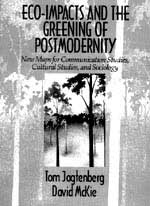A part of the whole
 all thought and human action, be it in the field of science or arts, is based on certain tenets. These principles have their origins in philosophical discourses propounded through the ages. All such philosophies have one thing in common - they have overplayed the importance of humankind and have always theorised on the way humans can better themselves. This alienates Homo sapiens from the rest of natural life. The rejection of their actual place in the web of life, where Homo sapiens are but a strand, leads to relationships which are based on dominance and subjugation.
all thought and human action, be it in the field of science or arts, is based on certain tenets. These principles have their origins in philosophical discourses propounded through the ages. All such philosophies have one thing in common - they have overplayed the importance of humankind and have always theorised on the way humans can better themselves. This alienates Homo sapiens from the rest of natural life. The rejection of their actual place in the web of life, where Homo sapiens are but a strand, leads to relationships which are based on dominance and subjugation.
Postmodernism as an ideology is breaking new ground as it poses unequivocal questions on prevailing concepts within all spheres. In the academic field, the areas that have been greatly influenced by this thought are sociology, communication studies and cultural studies. However, as Jagtenberg and Mckie point out, literature relating to these areas does not mention the steady destruction of the environment. Nor is there an attempt to understand the role of human beings in the web of ecology.
The authors have tried to formulate a greener concept for these areas by contrasting the visible impact of the ecological crises on popular culture with the less discernible academic responses to it.
The perception of nature has undergone several changes over the years as a divine force, a nurturer, a state of original innocence, and finally, something where people wish to escape to. In this journey the importance given to nature slowly decreases to something rarely mentioned and seen. People have alienated nature from their lives and have realigned themselves in a power play where humans are in a dominant position.
The authors consider the current state of the environment as an outcome of this impulse to dominate; it is the sole reason for the absence of ecological thought in today's world. They correlate the ways in which women are excluded from social and political thought and the marginalisation of ecological thought. In the same manner that women are subjected to active exclusion, pseudo-inclusion and alienation, the environment too is not given importance. It is either relegated to the back of peoples minds or the ecological processes so simplified that they seem mundane and of no consequence.
As the authors try to bring together concepts of feminism and ancient ecological thought to create a foundation for ecological awareness, it is interesting to note how our previous generations understood the environment.
The discussions on the new role of Homo sapiens are an important aspect of this book. The authors would not like to perpetuate the thought that the human species is a destructive one which perpetually alienates itself in order to subjugate, but one where humankind realises that "Whatever befalls the earth, befalls the sons of the earth. Man (sic) did not weave the web of life; he is merely a strand in it. whatever he does to the web, he does to himself.' And so learn to live at one with Nature.
The importance given to different methods of pedagogy and the suggestions on using modern methods of communication to bring across the message of ecological wholeness make for interesting reading. However, the book suffers from the predicament that a baby faces on its first attempts to walk. It grasps on to anything firm. In an attempt to bolster their arguments the authors use vast bodies of literature which they not only quote but also analyse. This leads to a piquant situation where even though interest is generated, it is not whetted as not enough reference is given to the works mentioned.
Related Content
- Order of the National Green Tribunal regarding encroachment and deforestation of Senchal Wildlife Sanctuary, 10/04/2024
- Institutionalising SDG localization in multi-level governance settings: lessons from India
- Judgment of the National Green Tribunal regarding concretization of open spaces and green belts in Punjab, 30/01/2024
- Order of the National Green Tribunal regarding concretization of the river bed and flood plain of the Ayad river, Udaipur, Rajasthan, 05/09/2023
- Urban transition pathways for the 2030 agenda for sustainable development: developing a national roadmap for sustainable development goal 11
- Unlocking smart grid opportunities in emerging markets and developing economies
